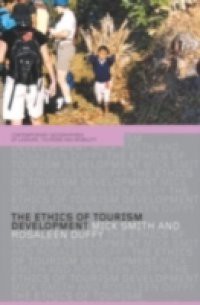Drawing upon a variety of important philosophical traditions, this book develops an original perspective on the relations between ethical, economic and aesthetic values in a tourism context. It considers the ethical/political issues arising in many areas of tourism development, including: the profound cultural and environmental impacts on tourist destinations the reciprocity (or lack of) in host-guest relations the (un)fair distribution of benefits and revenues the moral implications of issues such as sex tourism, staged authenticity and travel to oppressive regimes. The book concludes with a detailed investigation of the potential and pitfalls of ecotourism, sustainable tourism and community-based tourism, as examples of what is sometimes termed 'ethical tourism.'Until now, the ethical issues that surround tourism development have received little academic attention. Explaining philosophical arguments without the use of excessive jargon, this fascinating book interweaves theory and practice, aided by the use of text boxes to explain key terms in ethics, politics, and tourism development, and drawing on contemporary case studies from South Africa, Mexico, Zambia, Honduras, Ethiopia and Madagascar.

